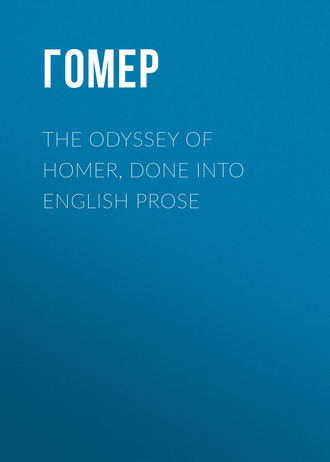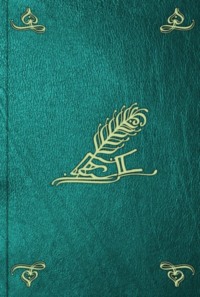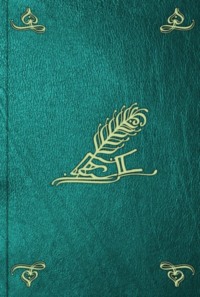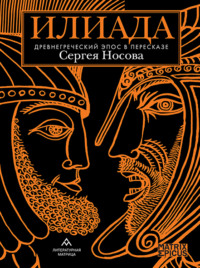 полная версия
полная версияThe Odyssey of Homer, Done into English Prose
After these words the twain set out to the goodly halls. Now when they had come to the fair-lying house, they found Telemachus and the neatherd and the swineherd carving much flesh, and mixing the dark wine. Meanwhile the Sicilian handmaid bathed high-hearted Laertes in his house, and anointed him with olive-oil, and cast a fair mantle about him. Then Athene drew nigh, and made greater the limbs of the shepherd of the people, taller she made him than before and mightier to behold. Then he went forth from the bath, and his dear son marvelled at him, beholding him like to the deathless gods in presence. And uttering his voice he spake to him winged words:
'Father, surely one of the gods that are from everlasting hath made thee goodlier and greater to behold.'
Then wise Laertes answered him, saying: 'Ah, would to father Zeus and Athene and Apollo, that such as I was when I took Nericus, the stablished castle on the foreland of the continent, being then the prince of the Cephallenians, would that in such might, and with mail about my shoulders, I had stood to aid thee yesterday in our house, and to beat back the wooers; so should I have loosened the knees of many an one of them in the halls, and thou shouldest have been gladdened in thine inmost heart!'
So they spake each with the other. But when the others had ceased from their task and made ready the feast, they sat down all orderly on chairs and on high seats. Then they began to put forth their hands on the meat, and the old man Dolius drew nigh, and the old man's sons withal came tired from their labour in the fields, for their mother, the aged Sicilian woman, had gone forth and called them, she that saw to their living and diligently cared for the old man, now that old age had laid hold on him. So soon as they looked on Odysseus and took knowledge of him, they stood still in the halls in great amazement. But Odysseus addressed them in gentle words, saying:
'Old man, sit down to meat and do ye forget your marvelling, for long have we been eager to put forth our hands on the food, as we abode in the hall alway expecting your coming.'
So he spake, and Dolius ran straight toward him stretching forth both his hands, and he grasped the hand of Odysseus and kissed it on the wrist, and uttering his voice spake to him winged words:
'Beloved, forasmuch as thou hast come back to us who sore desired thee, and no longer thought to see thee, and the gods have led thee home again; – hail to thee and welcome manifold, and may the gods give thee all good fortune! Moreover tell me this truly, that I may be assured, whether wise Penelope yet knows well that thou hast come back hither, or whether we shall dispatch a messenger.'
Then Odysseus of many counsels answered saying: 'Old man, already she knows all; what need to busy thyself herewith?'
Thereon the other sat him down again on his polished settle. And in like wise the sons of Dolius gathered about the renowned Odysseus, and greeted him well and clasped his hands, and then sat down all orderly by Dolius their father.
So they were busy with the meal in the halls. Now Rumour the messenger went swiftly all about the city, telling the tale of the dire death and fate of the wooers. And the people heard it, and all at once gathered together from every side with sighing and groaning before the house of Odysseus. And each brought forth his dead from the halls, and buried them; but those that came out of other cities they placed on swift ships and sent with fisherfolk, each to be carried to his own home. As for them they all fared together to the assembly-place, in sorrow of heart. When they were all gathered and come together, Eupeithes arose and spake among them, for a comfortless grief lay heavy on his heart for his son Antinous, the first man that goodly Odysseus had slain. Weeping for him he made harangue and spake among them:
'Friends, a great deed truly hath this man devised against the Achaeans. Some with his ships he led away, many men, and noble, and his hollow ships hath he lost, and utterly lost of his company, and others again, and those far the best of the Cephallenians he hath slain on his coming home. Up now, before ever he gets him swiftly either to Pylos or to fair Elis, where the Epeians bear sway, let us go forth; else even hereafter shall we have shame of face for ever. For a scorn this is even for the ears of men unborn to hear, if we avenge not ourselves on the slayers of our sons and of our brethren. Life would no more be sweet to me, but rather would I die straightway and be with the departed. Up, let us be going, lest these fellows be beforehand with us and get them over the sea.'
Thus he spake weeping, and pity fell on all the Achaeans. Then came near to them Medon and the divine minstrel, forth from the halls of Odysseus, for that sleep had let them go. They stood in the midst of the gathering, and amazement seized every man. Then Medon, wise of heart, spake among them, saying:
'Hearken to me now, ye men of Ithaca, for surely Odysseus planned not these deeds without the will of the gods. Nay I myself beheld a god immortal, who stood hard by Odysseus, in the perfect semblance of Mentor; now as a deathless god was he manifest in front of Odysseus, cheering him, and yet again scaring the wooers he stormed through the hall, and they fell thick one on another.'
Thus he spake, and pale fear gat hold of the limbs of all. Then the old man, the lord Halitherses, spake among them, the son of Mastor, for he alone saw before and after. Out of his good will be made harangue and spake among them, saying:
'Hearken to me now, ye men of Ithaca, to the word that I will say. Through your own cowardice, my friends, have these deeds come to pass. For ye obeyed not me, nor Mentor, the shepherd of the people, to make your sons cease from their foolish ways. A great villainy they wrought in their evil infatuation, wasting the wealth and holding in no regard the wife of a prince, while they deemed that he would never more come home. And now let things be on this wise, and obey my counsel. Let us not go forth against him, lest haply some may find a bane of their own bringing.'
So he spake, but they leapt up with a great cry, the more part of them, while the rest abode there together; for his counsel was not to the mind of the more part, but they gave ear to Eupeithes, and swiftly thereafter they rushed for their armour. So when they had arrayed them in shining mail, they assembled together in front of the spacious town. And Eupeithes led them in his witlessness, for he thought to avenge the slaying of his son, yet himself was never to return, but then and there to meet his doom.
Now Athene spake to Zeus, the son of Cronos, saying: 'O Father, our father Cronides, throned in the highest, answer and tell me what is now the hidden counsel of thy heart? Wilt thou yet further rouse up evil war and the terrible din of battle, or art thou minded to set them at one again in friendship?'
Then Zeus, the gatherer of the clouds, answered her saying: 'My child, why dost thou thus straitly question me, and ask me this? Nay didst not thou thyself devise this very thought, namely, that Odysseus should indeed take vengeance on these men at his coming? Do as thou wilt, but I will tell thee of the better way. Now that goodly Odysseus hath wreaked vengeance on the wooers, let them make a firm covenant together with sacrifice, and let him be king all his days, and let us bring about oblivion of the slaying of their children and their brethren; so may both sides love one another as of old, and let peace and wealth abundant be their portion.'
Therewith he roused Athene to yet greater eagerness, and from the peaks of Olympus she came glancing down.
Now when they had put from them the desire of honey-sweet food, the steadfast goodly Odysseus began to speak among them, saying:
'Let one go forth and see, lest the people be already drawing near against us.'
So he spake, and the son of Dolius went forth at his bidding, and stood on the outer threshold and saw them all close at hand. Then straightway he spake to Odysseus winged words:
'Here they be, close upon us! Quick, let us to arms!'
Thereon they rose up and arrayed them in their harness, Odysseus and his men being four, and the six sons of Dolius, and likewise Laertes and Dolius did on their armour, grey-headed as they were, warriors through stress of need. Now when they had clad them in shining mail, they opened the gates and went forth and Odysseus led them.
Then Athene, daughter of Zeus, drew near them in the likeness of Mentor, in fashion and in voice. And the steadfast goodly Odysseus beheld her and was glad, and straightway he spake to Telemachus his dear son:
'Telemachus, soon shalt thou learn this, when thou thyself art got to the place of the battle where the best men try the issue, – namely, not to bring shame on thy father's house, on us who in time past have been eminent for might and hardihood over all the world.'
Then wise Telemachus answered him, saying: 'Thou shalt see me, if thou wilt, dear father, in this my mood no whit disgracing thy line, according to thy word.'
So spake he, and Laertes was glad and spake, saying: 'What a day has dawned for me, kind gods; yea, a glad man am I! My son and my son's son are vying with one another in valour.'
Then grey-eyed Athene stood beside Laertes, and spake to him: 'O son of Arceisius that art far the dearest of all my friends, pray first to the grey-eyed maid and to father Zeus, then swing thy long spear aloft and hurl its straightway.'
Therewith Pallas Athene breathed into him great strength. Then he prayed to the daughter of mighty Zeus, and straightway swung his long spear aloft and hurled it, and smote Eupeithes through his casque with the cheek-piece of bronze. The armour kept not out the spear that went clean through, and he fell with a crash, and his arms rattled about his body. Then Odysseus and his renowned son fell on the fore-fighters, and smote them with swords and two-headed spears. And now would they have slain them all and cut off their return, had not Athene called aloud, the daughter of Zeus lord of the aegis, and stayed all the host of the enemy, saying:
'Hold your hands from fierce fighting, ye men of Ithaca, that so ye may be parted quickly, without bloodshed.'
So spake Athene, and pale fear gat hold of them all. The arms flew from their hands in their terror and fell all upon the ground, as the goddess uttered her voice. To the city they turned their steps, as men fain of life, and the steadfast goodly Odysseus with a terrible cry gathered himself together and hurled in on them, like an eagle of lofty flight. Then in that hour the son of Cronos cast forth a flaming bolt, and it fell at the feet of the grey-eyed goddess, the daughter of the mighty Sire. Then grey-eyed Athene spake to Odysseus, saying:
'Son of Laertes, of the seed of Zeus, Odysseus of many devices, refrain thee now and stay the strife of even-handed war, lest perchance the son of Cronos be angry with thee, even Zeus of the far-borne voice.'
So spake Athene, and he obeyed and was glad at heart. And thereafter Pallas Athene set a covenant between them with sacrifice, she, the daughter of Zeus lord of the aegis, in the likeness of Mentor, both in fashion and in voice.
Homer, thy song men liken to the sea,With every note of music in his tone,With tides that wash the dim dominionOf Hades, and light waves that laugh in gleeAround the isles enchanted: nay, to meThy verse seems as the River of source unknownThat glasses Egypt's temples overthrown,In his sky-nurtur'd stream, eternally.No wiser we than men of heretoforeTo find thy mystic fountains guarded fast;Enough – thy flood makes green our human shoreAs Nilus, Egypt, rolling down his vast,His fertile waters, murmuring evermoreOf gods dethroned, and empires of the Past.A. L.
1
Or, according to the ordinary interpretation of [Greek]: So he touched the chords in prelude to his sweet singing.
2
Tamasia, in the mountainous centre of Cyprus.
3
The [Greek] explains the expression of surprise at the sudden departure of the stranger.
4
Cf. B. xxi. 131. For the use of the 1st pers. pl. like our ROYAL plural, cf. B. xvi.44, Il. vii. 190.
5
Reading [Greek]. v. 1. '[Greek], which must be wrong.
6
A son of sorrow: Tristram.
7
Mr. Evelyn Abbott of Balliol College has suggested to us that [Greek] and [Greek] are here correlatives, and denote respectively the parts of host and of guest. This is sufficiently borne out by the usage of the words elsewhere.
8
Cf. B. xv.50
9
The only name for the Nile in Homer. Cf. Wilkinson, Ancient Egyptians (1878), vol. i. p. 7.
10
It seems very doubtful whether [Greek] can bear this meaning. The reading [Greek], 'smote,' preserved by the Schol. is highly probable.
11
[Greek], from root [Greek], 'ill-grown,' i. e. a weakling, in the literal sense as B. xi.249, xiv.212, or metaphorical, as here and viii. 177.
12
Lit. Strive after an arrival on the land, etc. [Greek] originally meant going, journeying, and had no idea of return. The earlier use survives here, and in Soph. Philoct. 43, Eur. Iph. Aul. 1261. Similarly, perhaps, [Greek] in Odyssey iv.619, xv.119, and [Greek] frequently
13
And for the women she favours, she ends the feuds of their lords also.
14
The distance here indicated seems to be that which the mule goes in ploughing, without pausing to take breath.
15
Literally, knowing neither dooms, nor ordinances of law.
16
We have omitted line 483, as required by the sense. It is introduced here from line 540.
17
Neither in this passage nor in B ii.171 nor in B xx.121 do we think that the aorist infinitive after a verb of saying can bear a future sense. The aorist infinitive after [Greek] (ii.280, vii.76) is hardly an argument in its favour; the infinitive there is in fact a noun in the genitive case.
18
Melampus
19
[Greek] seems to mean 'upon the earth,' 'above ground,' as opposed to the dead who are below, rather than 'bound to the soil,' in which sense most commentators take it.
20
See Lenormant, Premieres Civilisations, vol. i. p.289.
21
[Greek] in strict grammar agrees with [Greek] in 574, but this merely by attraction, for in sense it refers not to the living man, but to his phantom.
22
Reading [Greek], not [Greek] with La Roche.
23
Reading [Greek]
24
We omit line 101, which spoils the sense of the passage, and was rejected by antiquity.
25
Reading [Greek]
26
Reading [Greek]
27
[Greek] is perhaps best taken as an adverb in [Greek] formed from [Greek], though some letters of the word are still left obscure. Most modern commentators, however, derive it from [Greek] and [Greek] 'near the ground; hence, in this context, 'lift him by the feet.'
28
Reading [Greek]
29
[Greek] can hardly have a local meaning here. If retained, it must be nearly equivalent to [Greek], 'it seems,' with a touch of irony. Cf. i.348. The v. 1. [Greek] is a simpler reading, but by no means certain.
30
Placing at colon at [Greek], and reading [Greek] (cf. xix.312).
31
Accepting the conjecture [Greek] = [Greek] for the MSS. [Greek]
32
Reading [Greek]
33
Reading [Greek], which is a correction. Or keeping the MSS. [Greek] 'and this should bring thee in a goodly price,' the subject to [Greek] being, probably, THE SALE, which is suggested by the context.
34
The accepted interpretation of [Greek] (a word which occurs only here) is 'pretext'; but this does not agree with any of the meanings of the verb from which the noun is derived. The usage of [Greek] in Od. xix. 71, xxii. 75, of [Greek] in Il. xvii. 465, and of [Greek] in Od. xxii. 15, suggests rather for [Greek] the idea of 'aiming at a mark.'
35
Placing a colon at [Greek]
36
Or, reading [Greek], smite him as he stooped over the corpse.
37
Or, as Mr. Merry suggests in his note, 'tie boards behind him' as a method of torture. He compares Aristoph. Thesm. 931,940.
38
Reading [Greek].. [Greek].
39
Reading [Greek]
40
Supplying [Greek] from the preceding clause as object to [Greek]. Other constructions are possible.









